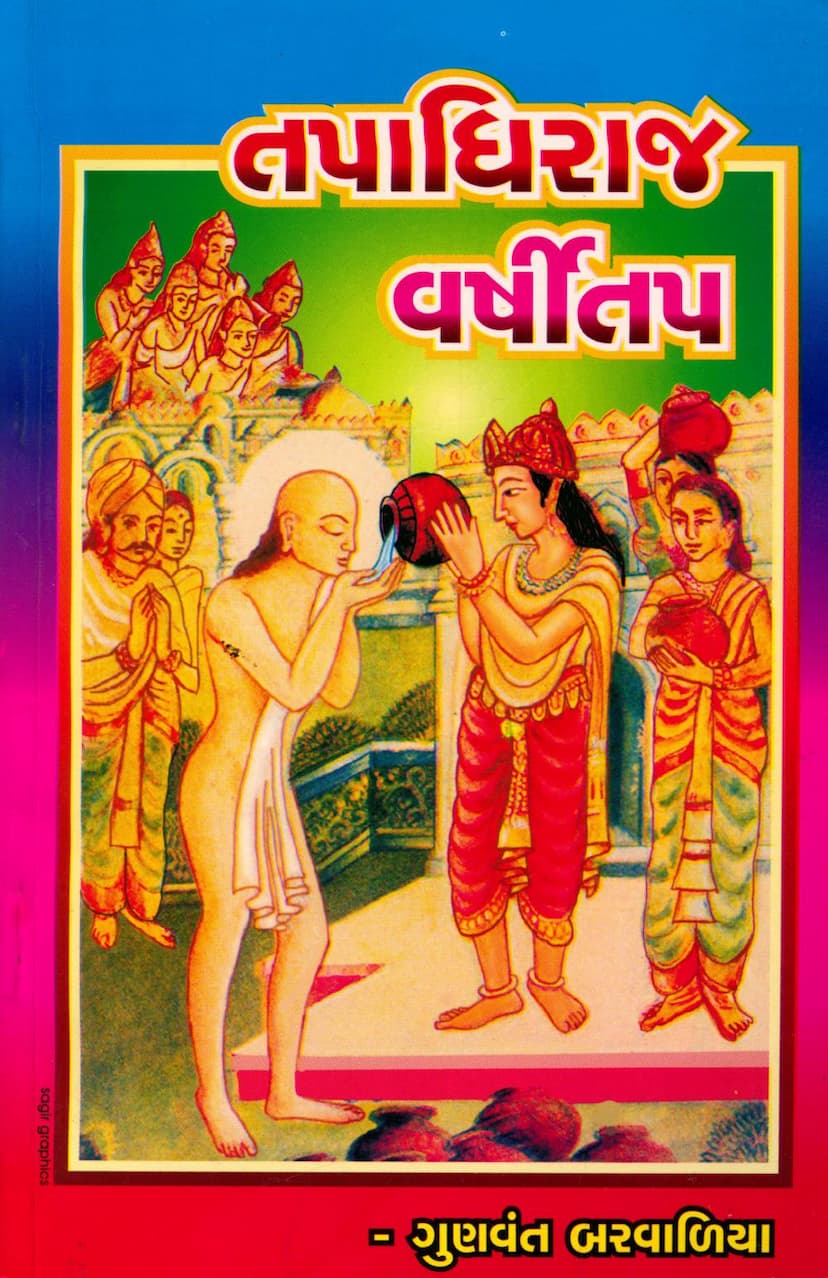Tapadhiraj Varshitap
Added to library: September 2, 2025

Summary
Here's a comprehensive summary of the Jain text "Tapadhiraj Varshitap" by Gunvant Barvalia, based on the provided pages:
Title: Tapadhiraj Varshitap (The King of Ascetics: Varshitap) Author: Gunvant Barvalia (Gunjan) Publisher: Viram Devshi Rita
Overall Theme: The book "Tapadhiraj Varshitap" focuses on the significance and practice of "Varshitap," a rigorous form of fasting and asceticism within Jainism, extending for a full year. It emphasizes that true tapas (austerities) go beyond mere physical abstention from food and drink; it's about controlling desires (specifically the 'aahar sangya' or food desire) and dedicating oneself to spiritual purification and karmic shedding. The book aims to inspire readers to undertake this profound spiritual journey, viewing the completion of Varshitap not as an end, but as a foundation for greater spiritual endeavors.
Key Concepts and Content:
- The Essence of Tapas: The text begins by clarifying that tapas is primarily for breaking the "aahar sangya" (the instinctual drive for food). It laments the common misunderstanding where individuals, after completing Varshitap, don't maintain practices like renouncing night meals, observing 14 specific vows, or abstaining from forbidden foods. These are seen as embellishments to Varshitap, not its core. A true "life-touching" tapas is emphasized over a mere one-year duration.
- Inspiration from Rishabhadeva: The book highlights Lord Rishabhadeva (Adinath), the first Tirthankar, as the prime inspiration for Varshitap. His life journey, from being a king to renouncing worldly possessions and embarking on extreme austerities (including a year of fasting), is detailed. His adherence to "nirjara" (shedding of karmas) for the sake of liberation is presented as the ultimate goal of tapas. The story of Shreyans Kumar offering sugarcane juice to Lord Rishabhadeva after his long fast is recounted, marking the origin of Akshay Tritiya and the importance of pure, unsolicited offerings.
- The Scientific Approach to Tapas: The text suggests a scientific perspective on tapas, noting its benefits for mental and physical health. It mentions that fasting can purify the digestive system, aiding in the elimination of toxins through a process called "autolysis." This, along with pranayama and attention to willpower, contributes to overall well-being and mental clarity.
- Types of Tapas: The book elaborates on the two main categories of tapas in Jainism:
- Six External Taps (Bahya Tap):
- Anshan: Fasting (from food and water).
- Unodari: Eating less than one's fill.
- Vrittisankshep: Restricting one's livelihood or begging practices.
- Rasparityag: Abstaining from pleasurable tastes or specific food items.
- Kayaklesh: Enduring physical hardship willingly.
- Pratisamlinata: Restraint of the senses and passions.
- Six Internal Taps (Aabhyantar/Aantrik Tap):
- Prayashchit: Penance and confession of faults.
- Vinay: Respect and humility towards elders and worthy individuals.
- Vaiyavachchhya: Service to the virtuous (ten types are listed, including service to the sick and ascetics).
- Swadhyaya: Self-study and scriptural learning.
- Dhyana: Meditation.
- Vyutsarga: Renunciation of attachment to the body and its functions.
- Six External Taps (Bahya Tap):
- The Importance of Internal Tapas: While acknowledging the role of external tapas, the book strongly emphasizes the superiority and necessity of internal tapas for true karmic purification and spiritual progress. It highlights that outward austerity without inner disposition is incomplete.
- Understanding "Vritti" (Tendencies): A key teaching from Mahasati Dr. Tarulata Swami is presented: "Vritti ne tode te Vrat" (A vow that breaks tendencies is a true vow). This emphasizes that true religious observance, especially tapas, should aim at breaking negative mental tendencies (vaibhavik vritti) and strengthening positive ones (swabhavik vritti).
- Tapas for Karmic Shedding (Nirjara): The core purpose of tapas is explained as "Nirjara," the process of shedding accumulated karmas. This is achieved through both external (reducing the influx of new karmas - Samvara) and internal efforts (destroying existing karmas - Nirjara). Tapas weakens and exhausts karmas.
- Tapas and Social Customs: The book critiques the prevalent social customs surrounding tapas, such as exchanging gifts and elaborate feasts. It argues that these practices, while perhaps originating from a desire to honor the ascetic, have become materialistic and may even foster new karmic bonds rather than shedding them. True honor comes from supporting the ascetic's spiritual journey, not from transactional gift-giving.
- The Process of "Pachkhan" (Vows): Detailed procedures for taking various vows (Chauvihar, Ektana, Ayambil, Upvas, Navkarsi, Porasi, etc.) are provided, along with the associated mantras and prayers. The importance of performing these vows with the correct intention and seeking guidance from spiritual masters is stressed.
- "Alochan" (Confession and Self-Reflection): The book dedicates a section to "Alochan," the process of introspection and confession of faults before a spiritual teacher. This is presented as a crucial step in purifying oneself, especially after undertaking a rigorous tapas. It involves acknowledging any lapses or improper intentions during the austerity.
- "Upkar Smaran" (Remembering Gratitude): A section on acknowledging the support of family, friends, and the community during the arduous journey of tapas is included, emphasizing the importance of gratitude and seeking forgiveness for any unintentional shortcomings.
- The Glorious Path of Mahavira: The ascetic practices of Lord Mahavir are described in detail, highlighting his dedication to both external (fasting, enduring hardships) and internal austerities (silence, meditation, control of senses and passions). His life serves as a prime example of how to integrate spiritual discipline with the pursuit of liberation.
- Tapas as a Solution: The book views tapas as a powerful solution not only for spiritual liberation but also for physical and mental health, helping to overcome addictions, enhance willpower, and achieve mental stability.
Target Audience: The book is intended for Jain followers, particularly those who are undertaking or considering the Varshitap, as well as spiritual seekers interested in the Jain path of asceticism and self-purification.
In essence, "Tapadhiraj Varshitap" is a spiritual guide that aims to provide a deeper understanding of Varshitap, moving beyond superficial observance to embrace its profound spiritual purpose of karmic purification and self-realization, inspired by the lives of Tirthankaras like Lord Rishabhadeva and Lord Mahavir.